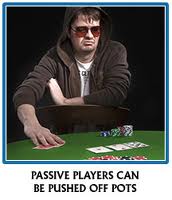
Successful poker players are aggressive. Therefore, if you make a pre-flop raise, in most cases, you should be continuation betting, also known as c-betting in poker, on the flop. However, playing against an opponent who is continuation betting is a bit trickier. Even though continuation bettors are often difficult to read, you shouldn’t allow them to push you around. Instead, apply this strategy:
Stopping Continuation Betting: 5 Ways
Tip #1: Begin Continuation Betting Yourself
The best way to learn how to play against continuation betting is to learn from yourself. That means becoming a continuation bettor and learning from it. When you raise pre-flop, bet the flop and then take note of how others respond to your continuation bets. What styles of play are successful at beating your style of play and what styles of play are unsuccessful?
Tip #2: Never believe a ‘checking’ continuation bettor
Continuation bettors have two gears. The first gear, which is most often, is to fire away at the flop. The other gear is to check the pot when flopping the nuts. Common continuation betting includes firing away when hitting top pair, small pair, a draw or nothing. These type of players enjoy checking flops in which they hit a set, straight, flush or higher. This is their attempt at being sneaky, so don’t fall for the trap. Wait for your opponent to bet on the turn or river and then muck your hand.
Tip #3: Check-raise dry or paired boards
Depending on your opponent’s pre-flop position, boards with an Ace, King or Queen are hard to check-raise on. Those cards are likely to hit a pre-flop raiser especially in early position. Check-raising dry boards (i.e. 2-3-8) is a smart play against continuation betting. Paired boards are also good opportunities to check-raise because continuation bettors often check paired boards when they hit trips. Plus, more often than not, your opponent will have missed.
Tip #4: Bet out when flopping top pair
Continuation bettors don’t take too kindly to facing a bet on the flop. They prefer being the first player to make a bet, and they are aggressive by nature. Therefore, if you throw out a bet when flopping top pair or better, you just might get paid off. Chances are your opponent will throw out a raise, even on a bluff. When you have a big hand, trick your opponent into putting as many chips in the pot as possible.
Tip #5: Just call when you flop the nuts
If you flop the nuts, don’t raise an opponent who is continuation betting. String them along. There’s no need to be aggressive against this type of player on the flop. Save the aggression for later in the hand. If your opponent missed on the flop, a check-raise will do you no good. Allow your opponent an opportunity to connect or to continue bluffing away at the pot on the turn and river.
To learn more poker strategy, visit our poker strategy articles section.

Comments are closed.